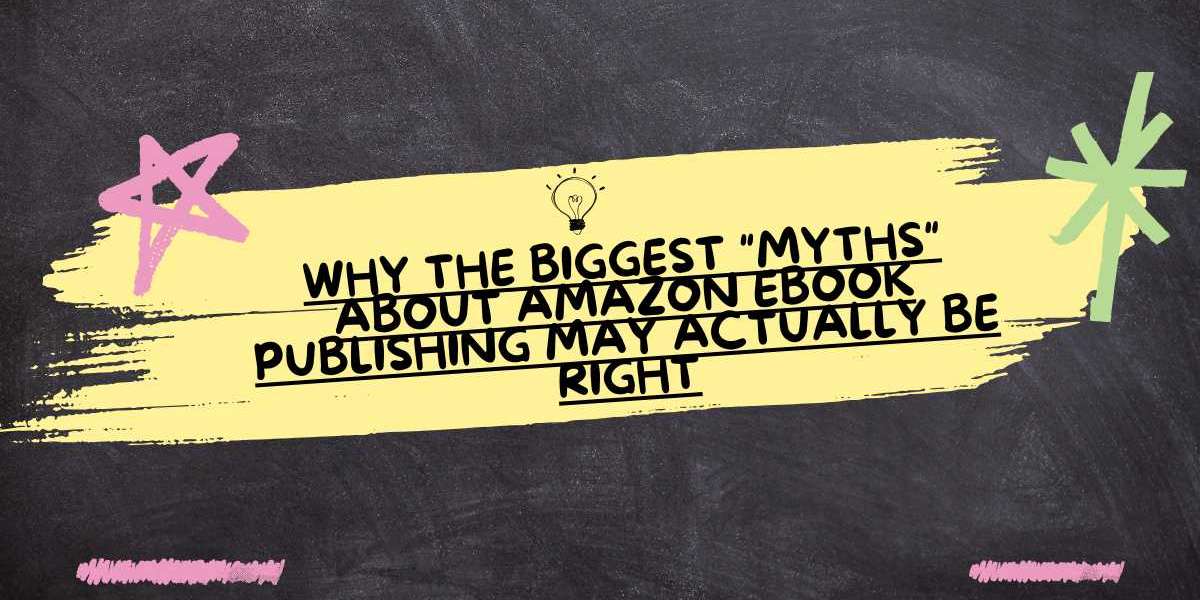Introduction
Amazon eBook publishing offers an easy way to reach readers worldwide. In recent years, Amazon eBook publishing has transformed the landscape of the publishing industry. Through Kindle Direct Publishing (KDP), aspiring authors have the opportunity to publish their works without the traditional barriers set by publishing houses. Despite its success, Amazon eBook publishing is often surrounded by numerous myths, some of which may seem like misconceptions at first but actually hold a grain of truth.
This article explores some of the biggest "myths" about Amazon eBook publishing, examining how they may actually reflect reality, and offering insights into the advantages and challenges of self-publishing on Amazon.
Myth 1: Anyone Can Publish a Book on Amazon Easily
At first glance, this myth may seem like a simple fact. After all, Amazon's Kindle Direct Publishing (KDP) platform allows authors to upload their manuscripts with a few clicks, but the reality is far more complex.
While it is technically easy to publish a book on Amazon, the real challenge lies in making it successful. The platform is highly competitive, with millions of books available for sale. To truly stand out, authors need to invest time in editing, formatting, marketing, and building a loyal readership. Self-publishing on Amazon may be easy, but publishing a successful book requires substantial effort, skill, and strategy.
The Truth:
The process is simple, but success on Amazon requires planning, promotion, and persistence.
Myth 2: Amazon eBooks Are Not Profitable
Many people believe that eBooks, particularly self-published ones on Amazon, are not profitable and that authors can’t make a significant income. This myth is partly based on the perception that self-publishing is a "side hustle" or "hobby" for authors, not a serious career path.
In reality, countless authors have achieved significant financial success through Amazon eBook publishing. Thanks to KDP’s royalty structure, authors can earn up to 70% royalties on sales, which is considerably higher than the typical 10% or 15% offered by traditional publishers. Additionally, Amazon’s massive global reach means that authors have the potential to earn income from international markets. With effective marketing strategies, a strong book, and a bit of luck, authors can generate substantial passive income.
The Truth:
Self-publishing can indeed be profitable, but it requires marketing, persistence, and quality content to succeed.
Myth 3: You Don’t Need to Worry About Marketing Your eBook
Some authors think that by simply uploading a book to Amazon, the sales will come automatically. The myth is that Amazon’s platform is so powerful that it will do the marketing for you. While it’s true that Amazon provides authors with tools like Kindle Unlimited, Kindle Countdown Deals, and other promotional services, the truth is that effective marketing is essential for success.
Authors need to take a proactive role in promoting their eBooks, which means using social media, building an email list, gaining reviews, networking with influencers, and participating in relevant online communities. The platform's algorithm may help discoverability, but authors still need to market their books actively to gain traction.
The Truth:
Amazon provides tools, but marketing your eBook remains an essential aspect of the publishing process.
Myth 4: All Amazon eBooks Are Low-Quality
Another prevalent myth about Amazon eBook publishing is that the platform is flooded with low-quality, poorly written books. This belief comes from the idea that anyone can publish a book on Amazon without the editorial standards set by traditional publishers.
While it’s true that the ease of self-publishing can lead to an abundance of low-quality books, it’s essential to note that the self-publishing industry is diverse. Many self-published authors invest in professional editors, cover designers, and marketers to ensure their books meet high-quality standards. In fact, some self-published eBooks have even achieved greater success than traditionally published ones.
The Truth:
While Amazon eBooks may vary in quality, there are plenty of high-quality, professionally edited, and well-designed books available.
Myth 5: eBook Sales Are Declining
Some people claim that eBook sales are on the decline, based on the rise of audiobooks, print books, and other media formats. However, statistics show that eBooks remain a highly popular format, especially on platforms like Amazon. The decline of eBook sales is more likely attributed to a temporary saturation in the market rather than a long-term trend.
Furthermore, many readers continue to prefer the convenience and affordability of eBooks over physical books. Amazon’s Kindle devices and apps make it easy for readers to access and enjoy eBooks, while the ease of purchasing and downloading books immediately adds to the appeal. With the global growth of the digital market and Amazon's continued dominance, the eBook industry remains strong.
The Truth:
While market trends shift, eBooks remain a popular and profitable format on Amazon.
Myth 6: Traditional Publishing Is Always Better Than Amazon eBook Publishing
Traditional publishing houses have long been seen as the gold standard in the literary world, with their high editorial standards, wide distribution networks, and marketing expertise. Some argue that publishing through Amazon’s platform is less prestigious or professional compared to traditional publishing.
However, in recent years, Amazon eBook publishing has increasingly become a legitimate and respected route for authors, especially those who want more creative control over their work. Many self-published authors have gained recognition and commercial success without the need for a traditional publisher. Amazon’s global platform also offers access to a much broader audience than most traditional publishers could provide.
The Truth:
While traditional publishing offers certain benefits, Amazon eBook publishing is increasingly seen as a legitimate and viable alternative for authors.
Myth 7: You Need to Be a Professional Writer to Publish on Amazon
A common misconception is that only professional, experienced writers can successfully publish eBooks on Amazon. This myth discourages aspiring authors who feel they are not skilled enough to write a book worthy of publication. Content writing is a crucial aspect of digital marketing, ensuring that businesses communicate effectively with their audience.
In reality, many successful Amazon authors come from diverse backgrounds and skill levels. While experience in writing certainly helps, what matters more is a commitment to improvement and quality. Even first-time authors can publish their work on Amazon, as long as they ensure their writing is well-edited, polished, and engaging. There are also plenty of resources available, including online courses, writing groups, and professional editors, to help new authors on their journey.
The Truth:
Anyone with a passion for writing and a commitment to producing high-quality work can publish on Amazon.
FAQs About Amazon eBook Publishing Myths
- Do I need an ISBN to publish an eBook on Amazon?
No, Amazon provides a free ASIN (Amazon Standard Identification Number) for each eBook published. You don’t need an ISBN unless you plan to distribute your eBook elsewhere or want to publish in other formats.
- Can I publish a book on Amazon without any upfront costs?
Yes, Amazon’s Kindle Direct Publishing platform allows authors to publish eBooks with no upfront costs. You can set your own price and earn royalties on sales.
- Can I publish a book with Amazon if I’ve previously been traditionally published?
Yes, many traditionally published authors choose to self-publish on Amazon to reach a wider audience or publish work outside their traditional publishing contracts.
- How much can I earn from publishing an eBook on Amazon?
Royalty earnings vary depending on the book’s price and sales, but authors can earn up to 70% royalties for books priced between $2.99 and $9.99.
- Is Amazon eBook publishing a good option for first-time authors?
Absolutely. Amazon’s self-publishing platform is ideal for first-time authors looking to break into the market, offering a straightforward process and a vast global audience.
Conclusion
Amazon Host offers scalable cloud computing services that enable businesses to efficiently manage their digital infrastructure. The myths surrounding Amazon eBook publishing often create misconceptions that can deter authors from embracing self-publishing. While there are challenges and considerations to take into account, the myths discussed in this article often contain a kernel of truth that highlights the competitive, dynamic, and evolving nature of Amazon’s self-publishing platform. With proper planning, strategy, and dedication, authors can find significant success in the world of Amazon eBook publishing.






